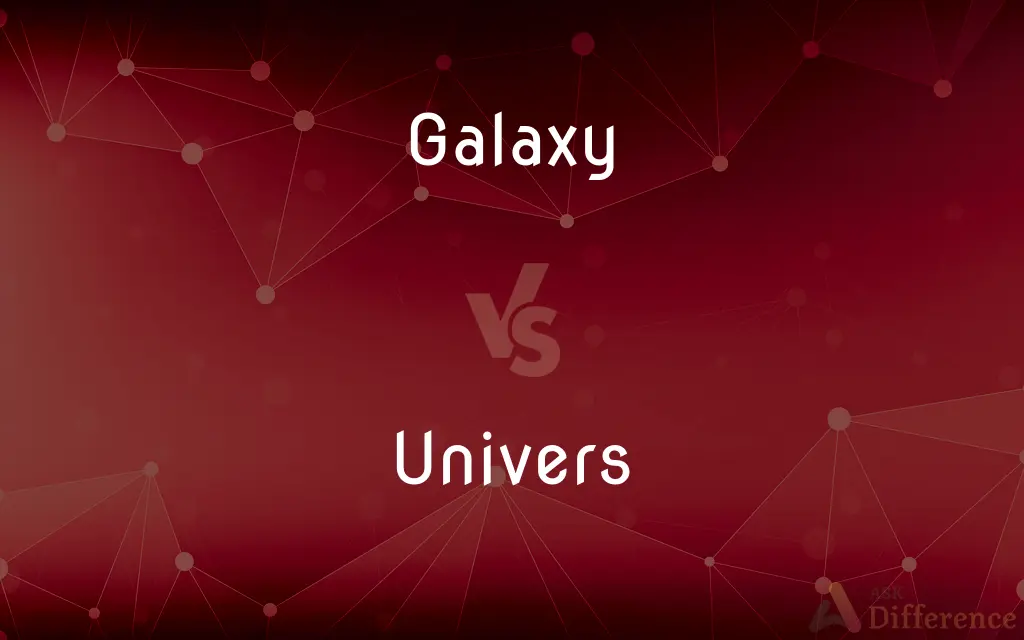Galaxy vs. Univers — What's the Difference?

Difference Between Galaxy and Univers
ADVERTISEMENT
Compare with Definitions
Galaxy
A galaxy is a gravitationally bound system of stars, stellar remnants, interstellar gas, dust, and dark matter. The word galaxy is derived from the Greek galaxias (γαλαξίας), literally "milky", a reference to the Milky Way.
Univers
Univers (French pronunciation: [ynivɛʁ]) is the name of a large sans-serif typeface family designed by Adrian Frutiger and released by his employer Deberny & Peignot in 1957. Classified as a neo-grotesque sans-serif, one based on the model of nineteenth-century German typefaces such as Akzidenz-Grotesk, it was notable for its availability from the moment of its launch in a comprehensive range of weights and widths.
Galaxy
A system of millions or billions of stars, together with gas and dust, held together by gravitational attraction.
Galaxy
Any of numerous large-scale aggregates of stars, gas, and dust that constitute the universe, containing an average of 100 billion (1011) solar masses and ranging in diameter from 1,500 to 300,000 light-years.
Galaxy
Often Galaxy The Milky Way.
ADVERTISEMENT
Galaxy
An assembly of brilliant, glamorous, or distinguished persons or things
A galaxy of theatrical performers.
Galaxy
The Milky Way; the apparent band of concentrated stars which appears in the night sky over earth.
Galaxy
(galaxy) Any of the collections of many millions or billions of stars, galactic dust, black holes, etc. existing as independent and coherent systems, of which there are billions in the known universe.
Galaxy
(figuratively) An assemblage of things or people seen as luminous or brilliant.
Galaxy
Any print or pattern reminiscent of a galaxy, generally consisting of blending, semiopaque patches of vibrant color on a dark background.
Galaxy
To furnish with galaxies.
Galaxy
(archaic) To gather together into a luminous whole.
Galaxy
The Milky Way, that luminous tract, or belt, which is seen at night stretching across the heavens, and which is composed of innumerable stars, so distant and blended as to be distinguishable only with the telescope.
Galaxy
A very large collection of stars comparable in size to the Milky Way system, held together by gravitational force and separated from other such star systems by large distances of mostly empty space. Galaxies vary widely in shape and size, the most common nearby galaxies being over 70,000 light years in diameter and separated from each other by even larger distances. The number of stars in one galaxy varies, and may extend into the hundreds of billions.
Galaxy
A splendid or impressive assemblage of persons or things; as, a galaxy of movie stars.
Galaxy
A splendid assemblage (especially of famous people)
Galaxy
Tufted evergreen perennial herb having spikes of tiny white flowers and glossy green round to heart-shaped leaves that become coppery to maroon or purplish in fall
Galaxy
(astronomy) a collection of star systems; any of the billions of systems each having many stars and nebulae and dust;
`extragalactic nebula' is a former name for `galaxy'
Share Your Discovery

Previous Comparison
Antie vs. Aunt
Next Comparison
Cod vs. Tomcod














































